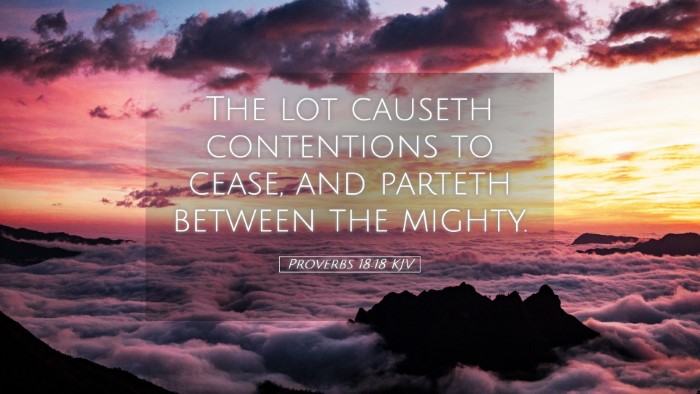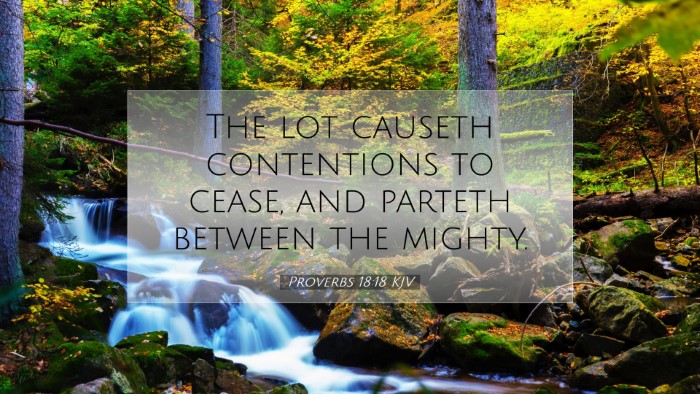Commentary on Proverbs 18:18
Verse: "The lot causeth contentions to cease, and parteth between the mighty."
Overview
Proverbs 18:18 presents a thought-provoking insight into decision-making and conflict resolution. It emphasizes the role of casting lots as a means of establishing justice and fairness among individuals, particularly in situations of dispute or contention. Below, we will examine this verse through the lenses of several public domain commentaries.
Insights from Public Domain Commentaries
Matthew Henry's Commentary
Matthew Henry observes that the act of casting lots serves as a divine method to end strife among powerful individuals. He asserts that when disputes arise, individuals often fail to reach a consensus due to their pride and desire for dominance. The mention of "mighty" suggests those in positions of authority or influence.
Henry elaborates that the usage of lots illustrates God's providence, ensuring that outcomes are determined by chance rather than human bias. This divine intervention can lead to peace, as it removes personal stakes from the equation, allowing for a resolution that all parties can accept. Thus, the lot becomes a means of showcasing God’s sovereign will over human affairs.
Albert Barnes' Notes on the Bible
Albert Barnes highlights the practical application of this proverb in everyday life. He points out that the casting of lots was a common practice in ancient cultures for making decisions. By invoking the concept of lots, the proverb suggests that in the heat of contention, where negotiations may fail, resorting to an impartial method can help restore order and resolve disputes.
Barnes emphasizes that this form of decision-making was seen not simply as random chance, but as aligned with divine will. Therefore, even in complex situations involving powerful individuals, yielding to divine guidance through the casting of lots fosters unity and peace among them. His conclusion rests on the broader theme of humility and submission to God's authority.
Adam Clarke's Commentary
Adam Clarke offers further nuance by exploring the cultural and historical context of the practice of casting lots. He notes that it was a practice rooted in the belief that God guided the outcomes of lots for the righteous and just. Clarke highlights the notion that while humans may seek to control outcomes through their desires or pressures, God ultimately governs all matters.
In Clarke's analysis, the phrase "causeth contentions to cease" captures the heart of the matter: when individuals submit their conflicts to God's providence, they open themselves to resolutions they may not have attained through human reasoning. Clarke also suggests that this principle is applicable beyond the specific scenario of lots, advocating for prayerful dependence on God in all circumstances of strife.
Theological Reflections
The theological implications of Proverbs 18:18 extend beyond its immediate application. It invites believers to reflect on issues of power, pride, and God’s sovereignty in conflict resolution. The verse underscores the importance of humility, suggesting that even the mightiest must yield to God’s will for peace and justice to prevail.
- Divine Sovereignty: The underlying principle is that God's control over fate and circumstance can lead to resolution, regardless of human strength or influence.
- Conflict Resolution: The proverb serves as a reminder that seeking God in decision-making may lead to harmony where pride and personal interests might otherwise reign.
- Implications for Leadership: Leaders are particularly called to recognize that their authority is ultimately derived from God, guiding them to act with wisdom and integrity in resolving disputes.
Practical Application
For pastors, students, theologians, and Bible scholars, Proverbs 18:18 offers pivotal lessons for use in counseling, leadership, and ecclesiastical governance. Here are some points of application:
- Encouraging Fairness: When addressing conflicts, encourage reliance on prayer and impartial methods to reach resolutions, fostering an environment of fairness and mutual respect.
- Teaching Dependency on God: Model for congregations the importance of surrendering disputes to God, illustrating the peace that comes from relinquishing control.
- Promoting Humility: Encourage leaders to embrace humility, acknowledging that true power lies in aligning with God's will rather than exerting personal authority.
Conclusion
Proverbs 18:18 serves as a profound reminder of the importance of seeking divine guidance in an often-contentious world. Through insights gleaned from respected commentaries, we see a call to embrace practices that foster peace, justice, and humility. Such principles are invaluable for anyone engaged in the study or teaching of Scripture, as they can lead to profound transformation in personal and communal relationships.


